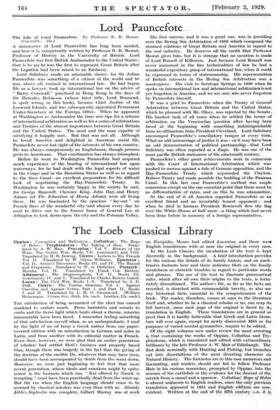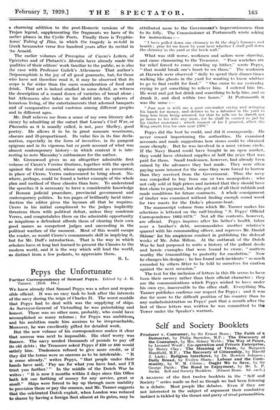The Loeb Classical Library
Oppian Cynegetica and Halieutica ; Colluthus : The Rape of Helen ; Tryphiodorus : The Taking of Ilios. Trans- lated by A. W. Mair. Procopius : Vol. V. History of the Wars, The Gothic War, Books VII. (continued) and. VIII. Translated by H. B. Dewing. Cicero : Letters to His Friends Vol. II. Translated by W. Glynn Williams. Epictetus Vol. II., Arrian's Discourses, Books III. and IV., The Manual and Fragments. Translated by W. A. Oldfather. Plutarch : Moralia, Vol. II. Translated by Frank Cole Babbitt. Athenaeus : The Deipnosophists, Vol. II., Books (continued), IV. and V. Translated by Charles Burton Gulick. Lucan : The Civil War, Books I.-X. Translated by J. D. Duff. Cicero : The Verrine Orations, Vol. I. Against Caecilius and Against Verres, Part I. and Part IL, Books I. and II. Translated by L. H. G. Greenwood. (William Heinemann. Crown 8vo, cloth, 10s. each. Leather, 12s. each.) THE satisfaction of being accounted of the elect has caused mankind to endure much. From hairshirts and corsets to snubs and the fierce light which beats about a throne, miseries innumerable have been faced. I remember feeling something of that satisfaction myself when, as an undergraduate, I read by the light of an oil lamp a Greek author from one paper- covered edition with an introduction in German and notes in Latin, and from another with its editorial matter -in -French. Even then, however, we were glad that an earlier generation of scholars had settled Hoti's business and properly based Oun, though there was tragedy in the fact that the giving of the doctrine of the enclitic De, whatever that may have been, should have been accompanied by death from the waist down. Moreover, we were just -beginning- to feel that that more recent generation, whose ideals and emotions might be epito- mized in the footnote which ran, " Kai offered by Nauck is tempting," must have been practically dead from the waist up. But the era when the English language should* cease to be, scorned by classical scholars was even then with us. Already Jebb's Sophocles was complete, Gilbert Murray was at work
_ .
on Euripides, Monro had edited Lucretius, and there were English translations with or near the original in every case.
In the Loeb Classics the incubation of the text is kept discreetly in the background. A brief introduction provides for the curious the details of its family history and an unob- trusive footnote here and there indicates blots on the family escutcheon or obstetric troubles in regard to particular words and phrases. The use of the text to illustrate grammatical rules, which after all owe their origins to the texts, is fortu- nately discontinued. The author's life, as far as the facts are recorded, is sketched with commendable brevity, as also are any historical facts essential to the comprehension of the book. The reader, therefore, comes at once to the literature itself and, whether he be a classical scholar or no, can reap its full harVest, since each page of the original is faced by its translation in English. These translations are in general so good that it is hardly believable that Greek and Latin liters-. ture will ever again, except for newly discovered MSS or for purposes of varied mental gymnastics, require to be edited.
Of the eight volumes now under review the most arresting is that containing the works of Oppian, Colluthus and. Try- phiodorus, which is translated and edited with extraordiniry brilliance by the late Professor A. W. Mair of Edinburgh. The first deals nominally with Hunting and Fishing, but branches out into dissertations of the most diverting character on Natural History. The footnotes are in this case numerous and fascinating, and readers, should not fail to follow Professor Mair in his curious researches, prompted by OPPian, into the amours of the cuttlefish or the eVidence for the descent of the ostrich froip a camel and a sparrow. C011uthuis' Rape of Helen` is almost unknown to English readers, since the only previOUs'
. translation appeared in 1651 and English editions are non-
existent. . existent. Written at the end of the fifth century A.D. it is a charming addition to the post-Homeric versions of the Trojan legend, supplementing the fragments we have of its earlier phases in the Cyclic Poets. Finally there is Tryphio- dorus' Taking of Rios, in which the tragedy is re-told in Greek hexameter verse five hundred years after its recital in the Aeneid.
The earlier volumes of Procopius of Cicero's Letters, of Epictetus and of Plutarch's Moralia have already made the lualities of their editors' work familiar to the public, as is also the case with Professor Gulick's Athenaeus That author's Deipnosophists is the joy of all good gourmets, but, for those who have not therefore read it, it may be observed that its scope is far wider than the mere consideration of food and drink. That art is indeed studied in some detail, as witness the description of a round dozen of varieties of bread alone ; but Athenaeus also takes us far afield into the spheres of luxurious living, of the entertainments that adorned banquets and of comparative social customs among different peoples and in different ages.
Mr. Duff relieves me from a sense of my own literary defi- ciency by admitting at the outset that Lucan's Civil War, or Pharsalia as it is usually called, is not, pace Shelley, good poetry. He allows it to be in great measure wearisome, obscure and ill-proportioned. Its value lies in its fine decla- mation, especially in the form of invective, in its pungent epigram and in its vigorous but ex parte account of what was almost contemporary history—in which context it is inte- resting to note Macaulay's enthusiasm for the author.
Mr. Greenwood gives us an altogether admirable first
volume of Cicero's Perrine Orations, together with the speech against the rival counsel, whose appointment as prosecutor, in place of Cicero, Verres endeavoured to. bring about. No- where, perhaps, could be found a better example of the whole plan and method of these classics than here. To understand the speeches it is necessary to have a considerable knowledge of Roman judicial procedure, provincial government and amtemporary politics. In ten pages of brilliantly lucid intro- duction the editor gives the layman all that he requires. Cicero in his initial compliment to the judges implicitly threatens them with political defeat, unless they condemn Verres, and congratulates them on the admirable opportunity so iniquitous a defendant affords them of clearing their own good names as competent judges and succeeding in the political warfare of the moment. Most of this would escape the reader, as would Cicero's consummate skill in implying it, but for Mr. Duff's introduction. That is the way in which scholars have at long last learned to present the Classics to the modern world, and it is the way which will lead the world, as distinct from a few pedants, to appreciate them.
B. L.









































 Previous page
Previous page